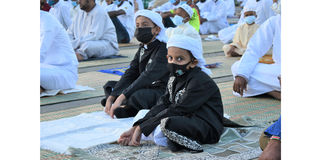Kenyans set for 5-day weekend as Tuesday gazetted holiday

Children attend Idd morning prayers at Masjid Ummu Kulthum in Kizingo, Mombasa County on May 14, 2021.
Kenyans are set for a five-day weekend after Interior Cabinet Secretary Fred Matiang'i declared Tuesday a public holiday to mark Idd-ul-Fitr.
Idd-ul-Fitr marks the end of Ramadhan, a month-long period of fasting and prayers.
The government had also declared Friday April 29 a national holiday following the death of President Mwai Kibaki.
Dr Matiang’i, who chairs the National Funeral Steering Committee for the late President, said the day will be spent paying last respects to the former Head of State. A state funeral for the third president will be held at Nyayo National Stadium, Nairobi, on the same day.
The long weekend will begin on Friday and will run to Tuesday, May 3. On May 1, Kenyans will be celebrating Labour Day, a public holiday held in honour of Kenyan workers.
“In exercise of the powers conferred by section 3 of the Public Holidays Act, the Cabinet Secretary for Interior and Coordination of National Government declares Friday, April 29, 2022, to be a public holiday throughout the Republic in order to accord all Kenyans the opportunity to participate in the State Funeral Service in honor of the life of the late H.E Mwai Kibaki, the third President of the Republic of Kenya,” the notice read.
Dr Matiang’i also mentioned Tuesday as another public holiday to mark Idd-ul-Fitr – which is an important religious holiday celebrated by Muslims worldwide to mark the end of the holy month of Ramadhan.
Ramadhan is the ninth month of the Islamic calendar. It lasts 29 or 30 days, depending on the lunar cycle. During the month, believers fast and pray. Muslims began observing the holy month of Ramadan in April.
The festival, unlike the previous two years, will not be marked under strict observance of Covid-19 containment measures.
Muslims, who will gather in mosques or open spaces before 9am, will celebrate the day with prayers known as “Salat Al Eid.”
The series of prayers are usually followed by a sermon where they will ask for forgiveness and also pray for peace across the world.





